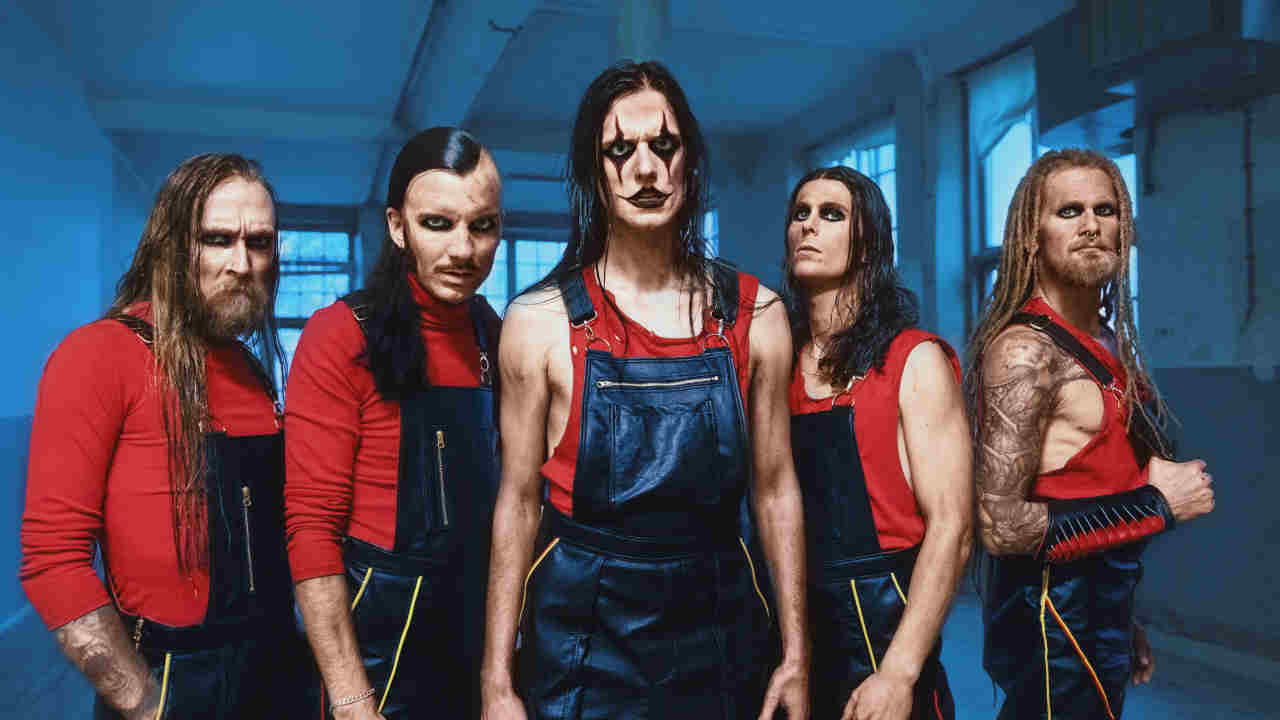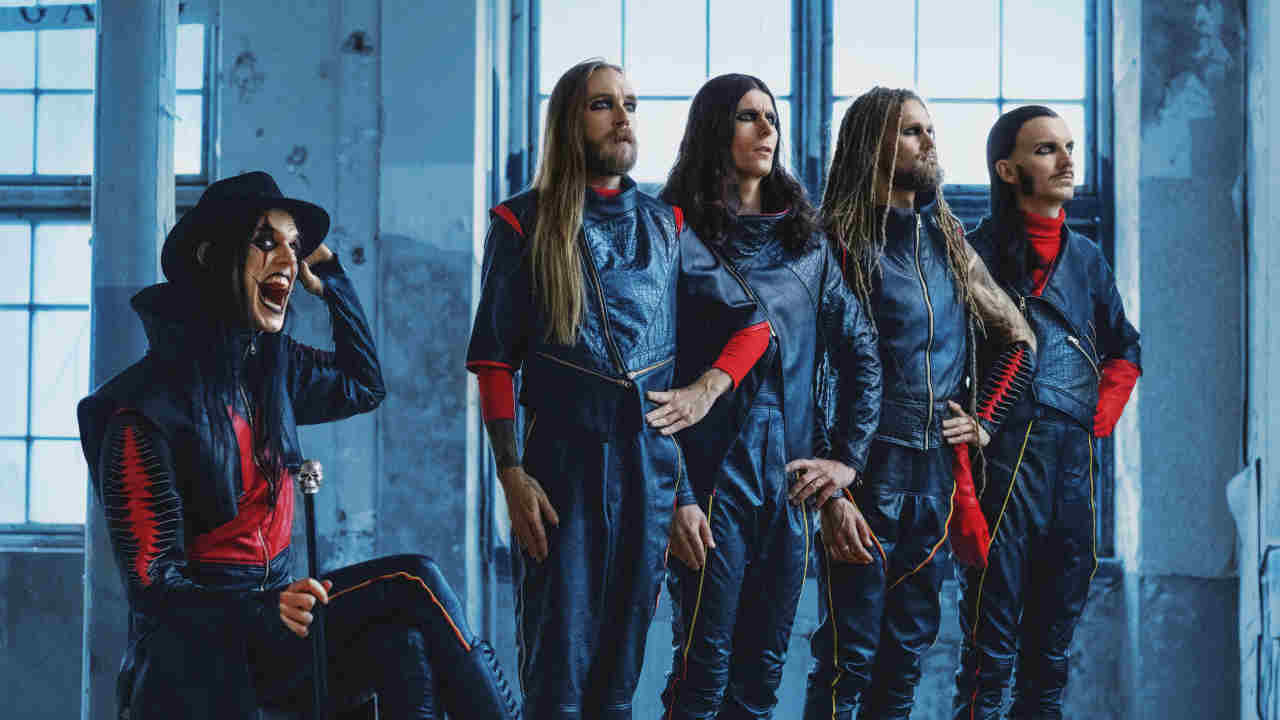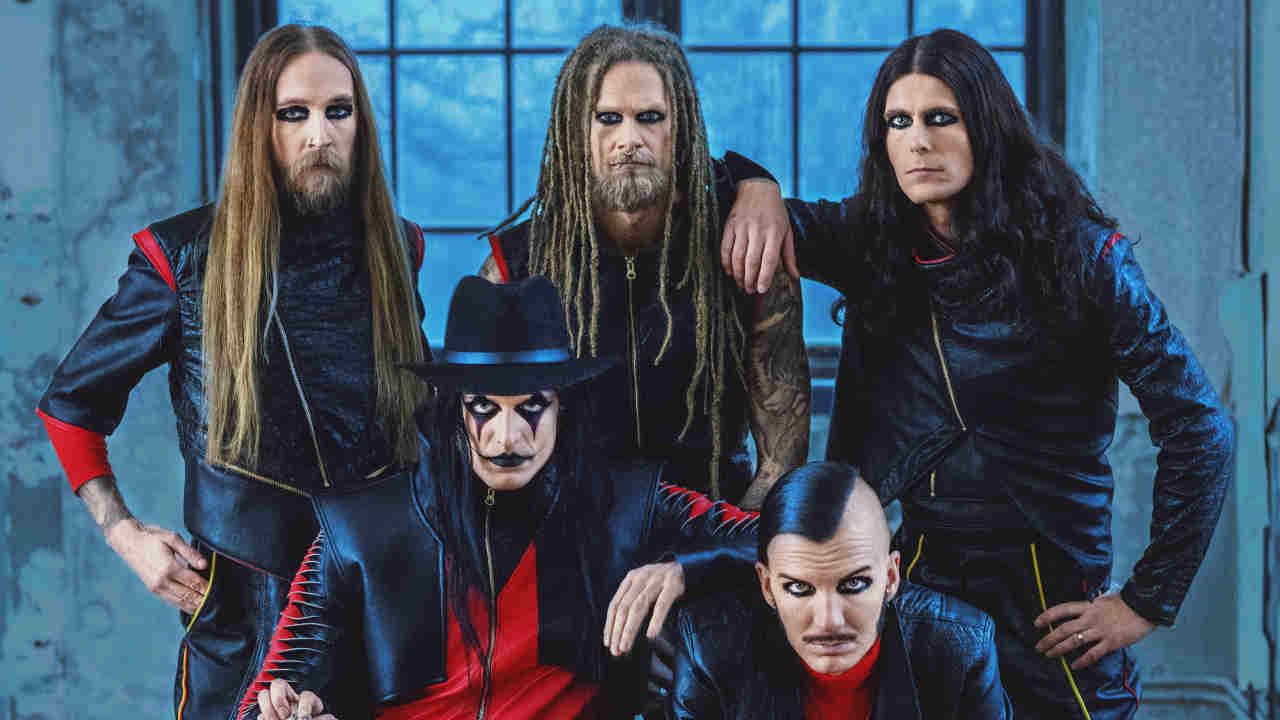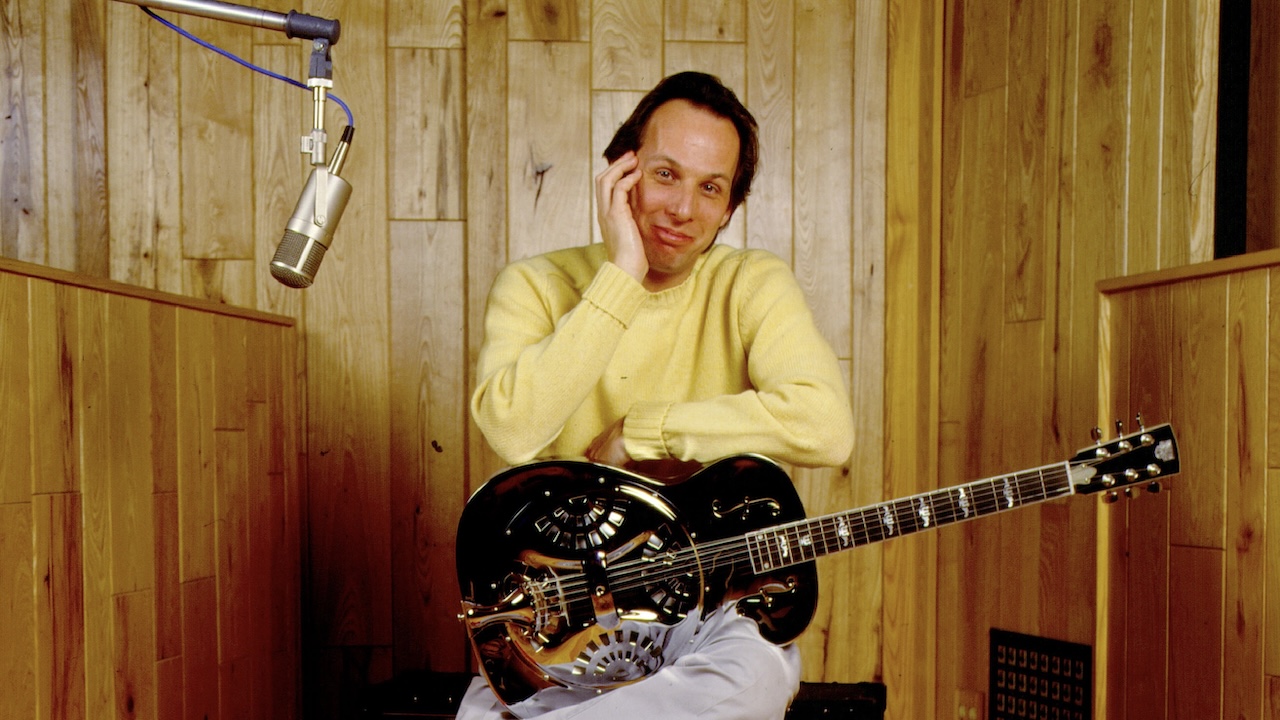The planet is f**ked and Avatar are seriously pissed about it
Think Avatar are just about loud costumes and OTT gimmicks? Wrong. And now it’s time to get serious

Select the newsletters you’d like to receive. Then, add your email to sign up.
You are now subscribed
Your newsletter sign-up was successful
Want to add more newsletters?
A gilded throne rises up from Download’s main stage, bearing Avatar guitarist Jonas Jarlsby, AKA The King. The man at the centre of the band’s carnivalesque Avatar Country concept album, he surveys his subjects as he riffs, and a huge cheer goes up. It’s mad, it’s Avatar literally taken to the next level, and it’s warmly received by a festival crowd who are here to let loose. This Friday afternoon in June 2018 feels like a real moment for the Swedes, who have significantly increased their audience since playing the same stage two years earlier.
“The Avatar Country stage show was very pornographic in that it was very in-your-face, and didn’t leave much to the imagination,” singer Johannes Eckerström grins today, sitting on his sofa at home in Helsinki, with chihuahua Jacob curled up at his feet. “That stage show had implants!”
- Cheap vinyl records September 2020: Top vinyl records on sale in rock, metal, prog and more
- The best metal guitars 2020: Get ready to shred with our essential list
- Less noise, more rock with the best budget noise cancelling headphones
- Best music streaming services: how do Spotify, TIDAL, Apple Music and others compare?
The cult of Avatar has been growing steadily. Avatar Country reached No.25 on the US Billboard Chart (up from 88 for previous album Feathers & Flesh), and fans forked out $188,000 to fund a movie based on its colourful concept (which even featured a bandmember reading issue 11 of this very magazine). In Europe, they nailed their first festival slot at Belgium’s Alcatraz last August, and if it hadn’t been for the pandemic, they would have supported Iron Maiden in Paris and Zurich in July. Meanwhile, Johannes says their streaming numbers have shot up in new territories such as Mexico.
“We’ve been heading upwards for quite some time now, and it’s happening at this nice, slow, steady pace where you have time to notice it, and where I don’t feel the drop has to be so brutal,” he smiles. “We have songs that are extremely popular among people who are into us, but we haven’t had a hit. The beautiful thing with metal is that the songs that were popular, like Hail The Apocalypse in 2014, remain relevant to people and can be discovered by new people. It doesn’t work with trends the way the other music genres do. So Reign In Blood doesn’t feel old. Iron Man doesn’t feel old. With heavy bands, their relevance never goes away because there’s something timeless about it. It’s not my place to say that what we do will prove to be timeless, but it’s been lasting.”
Part of Avatar’s appeal is that ambitious stage show, which draws you into a fanciful world of creativity and wonder, but it wouldn’t mean much if it wasn’t backed up by the songs. But if Feathers & Flesh (about an owl who goes to war with an eagle) and Avatar Country were expansive concept albums with the whimsy factor turned up to 11, new album Hunter Gatherer represents something more grounded. Rather than being fully conceptual, it has a ‘red thread’ running through it, Johannes’ explanation of which lasts for a full five minutes.

There’s a clue in the title: Hunter Gatherer. His argument goes that we were wired to live in the Stone Age, which was probably a decent way of life for individuals. But due to our big brains, we slowly created a more complex reality for ourselves. First agriculture came along, successfully allowing us to feed more people, yet the introduction of primitive tools led to arthritis, back problems, and a push to produce more children to plough the fields. As the population grew, we became more exposed to disease, reliant on monoculture, vulnerable to famine and fought over land. Then the industrial revolution brought pollution, terrible factory conditions and longer working days. Post World War II, the standard of living has increased for many countries, but at what cost?
“Everyone is heading for the better, except that the planet’s on fire, the oceans are dying, birds are eating plastic caps from toothpaste tubes… we are in a mess,” he says. “And we are in this mess while living in this weird, digital, high-tech, material gilded cage that is on one hand great, because we are on Zoom talking about my new album, but it’s very, very detached from what evolution made us out to be. And we are still exactly the same animal. We haven’t had time to adapt to what we’ve built around us. So the album deals with what it means to be homo sapiens, with our understanding of that in this world we have built for ourselves. There are some personal songs, but they’re always presented against the backdrop of that big picture of us living in this cyberpunk dystopia that Fear Factory warned us about 25 years ago!”
Sign up below to get the latest from Metal Hammer, plus exclusive special offers, direct to your inbox!
They also noticed that the songs deal with “the problem of being in one’s own way” - what’s the biggest obstacle in you improving your relationships? What’s the biggest obstacle for us to clean up this planet? For Johannes, that means putting aside his discomfort to personally and lyrically speak out about the ethics, morals and politics that matter to the band. He wouldn’t call himself an activist, he doesn’t feel “preachy”, and he knows that just by living in modern times he’s complicit in some of our problems. But it’s no secret that Avatar are vegan, and during our conversation this morning he’s not afraid to talk about the scientific evidence for pandemics occurring because of our close contact with animals, or about the way humans operate in our own interests. The band’s thoughtfulness has always lain beneath the surface of their music, and he talks about “peeling away a layer of bullshit”.
“If I’m pissed over something that’s wrong, maybe it doesn’t always have to be in a metaphor,” he says. “Maybe, if I’m being really honest, I can aim that anger towards the world and myself. And that is a song like When All But Force Has Failed. The first two lines are: ‘Bird carcass with a belly full of plastic / one more year and I’ll be a millionaire.’ I think there’s no mistaking where the anger’s aimed as far as what we’re doing and also my own part – dealing with my own hypocrisy while dealing with trying to confront everyone else’s. And me not being sure if I was willing to deal with the consequences of being outspoken on certain things… I have been in my own way.”
hat’s not to say Hunter Gatherer shortchanges us on the storytelling front, though. Even with their environmental and social consciousness more on display, Avatar’s collective imagination is wilder than most metal bands could ever dream of. There’s an ethical dilemma about a digitised human brain (Colossus) and a vivid retelling of a nightmare (God Of Sick Dreams). Set in the Victoria era, the storming Child is a deadly, gothic narrative about a mother who’s deemed to be hysterical, given a lobotomy and dies, leaving her offspring to try and work out what’s happened.
“The verses are this cold, adult world talking behind a child’s back, with no one approaching the child and making them part of the mourning process,” explains Johannes. “Also the child senses that something is wrong, and then it becomes a ghost story because I learnt – probably through a horror movie – about this old custom of having a string going down to the casket, following up to a bell above ground. So, ‘Ding ding! I’m not actually dead!’ That bell would ring but no one would listen, because there’s also a sense of, ‘Phew, good riddance, we got rid of her.’ So there is oppression of women, and child abuse, and mistreatment of mental illness, and escapism. There’s a bunch of stuff packed into that story.”

As usual with Avatar, Hunter Gatherer swings from ferocious death metal to classic thrash and rumbling doom, with a good few guitar solos thrown in, in homage to the diverse spectrum of heavy music they love. They recorded at LA’s Sphere Studios with returning producer Jay Ruston (“He’s an animal-rescuing, tofu-eating, heavy-metal-listening kind of fella as well, and at the same time we can enjoy some good locker room banter!” laughs Johannes). Feathers & Flesh had been a “studio monster” while Avatar Country was made in time crunch, so for the first time since 2014’s Hail The Apocalypse, they recorded live takes together as a band, trying to capture their onstage vibe. When they took this approach six years ago, it was because they’d seen Dave Grohl’s Sound City documentary while drunk on the plane over to the studio in Thailand, and wanted to emulate Led Zeppelin and The Beatles.
“It’s easy to put your predecessors on a pedestal. It’s very hard for me to believe Paul McCartney also put his pants on one leg at a time. It goes for all these people we admire because of what the music has meant to us,” says Johannes. “But you realise somewhere along the way, they were human. Also, the whole point of why we like those banner albums of the past is there’s a human factor, and if you listen really closely, they are great takes. They’re not always computer-perfect and it sounds better. So we are looking for the mistakes, in a way. Like, ‘Hey, we’re great at mistakes! Let’s record live!”
When they’re eventually able to perform live, they’re intending to make a memorable return – though not in the bells-and-whistles way you might expect. Johannes talks about ‘black box theatre’, where there’s an empty performance space. If you roll in a park bench, you’re in a park. If you roll in a couch, you’re in a living room. It’s about activating people’s imaginations to tell stories in a less obvious way, without relying on the “pornographic”, OTT spectacle of old.
“We have big thoughts that go hand- in-hand with the whole point of the album – that it’s the album that brought us back to planet Earth, in many ways,” he says. “Going with the analogy of pornography, the next stage show will be more about eroticism, where you make the audience work a bit more for it. And then in that way, create a deeper, more emotionally involved type of concert.”
Just when you think you know Avatar, they lob a curveball into metal’s playing field. It also speaks to Johannes’ reflective, curious, metal-obsessed character that when we ask what his ambitions for are for the band, he doesn’t talk about fame and fortune or noteworthy venues, but of embarking on an extensive tour of Africa and making a documentary about the metal scenes of its different countries. Metal is global, and Avatar care about the planet and its inhabitants.
“Not everyone was happy about the whole Live Aid thing, because the whole image that was being sold to the world was always this sickly, starved continent when there’s so much more to it,” he explains. “I think the cool thing about metal as a subculture is how borderless it is, and how it always marries the local flavour so well, from Alien Weaponry to Sepultura to every second Finnish folk band. I have no idea how to put it into fruition right now, but I’m dreaming big.”

Eleanor was promoted to the role of Editor at Metal Hammer magazine after over seven years with the company, having previously served as Deputy Editor and Features Editor. Prior to joining Metal Hammer, El spent three years as Production Editor at Kerrang! and four years as Production Editor and Deputy Editor at Bizarre. She has also written for the likes of Classic Rock, Prog, Rock Sound and Visit London amongst others, and was a regular presenter on the Metal Hammer Podcast.
